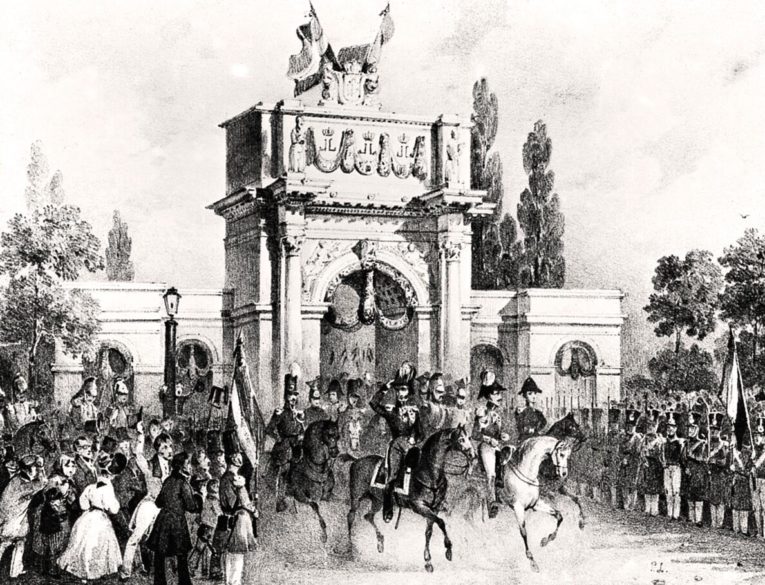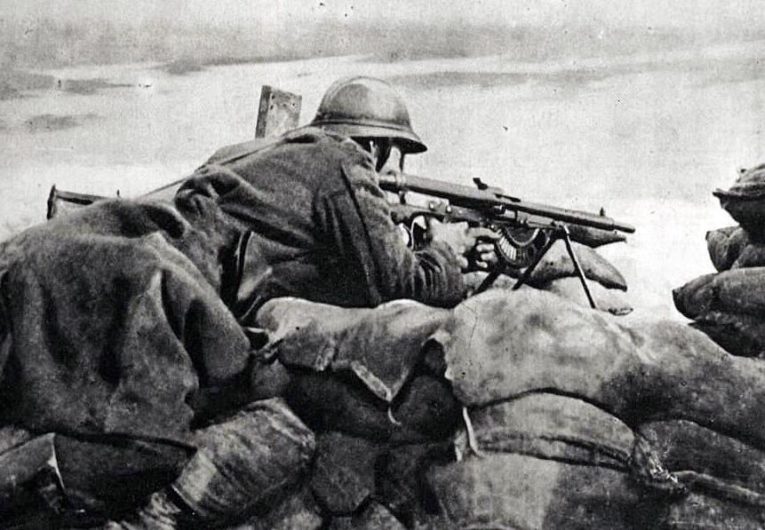Independent Belgium
During the peace period 1832–1914, the business world flourished. Belgium was the first country on the continent where the industrial revolution spread. The country became the most industrialized in the world after Britain. At the same time, the population grew rapidly. But the political and cultural contradictions persisted. The new state was intended to be a French state, but at the same time was the country where Dutch culture and the Dutch cultural language were first formed, and where the Flemish population still constituted the majority. As the Flemish social and intellectual awareness increased and the democratic principles were implemented at the political level, a bilingual status and equality between French and Flemish language and culture was forced.
King Leopold 1s entered Brussels in 1831. Lithograph.
In 1885, Congo became Leopold 2’s personal possession; There was thus a personal union between Belgium and the Congo that lasted until 1908, when the Congo, after difficult negotiations between the king and parliament, was annexed as Belgian Crown Colony (Belgian Congo).
After a long battle across party lines, Flemish in 1898 was equated with French by promulgation of laws. In 1893, ordinary voting rights for men were introduced. In 1909 and 1913, general conscription was introduced. Although there was a certain German friendliness among the Flemish people during their struggle for equality, in Belgium there was a strong distrust of Germany. Just before World War I, military negotiations were held between Belgium and the United Kingdom, but they did not lead to a firm agreement.
World war one
On August 4, 1914, German troops entered Belgium and commenced combat operations in the First World War. The country became a scene of war, and in Flanders some of the greatest battles of the war were fought. The occupation was crippling to Belgium’s business and famine threatened. Violent indignation aroused the German decree in 1916 concerning the deportation of unemployed Belgians to Germany. However, under their harsh occupation regime, the Germans favored the Flemish population; in Flanders, French language was banned, and in 1915 the University of Ghent was converted to Flemish.
By the peace agreement in 1918, Belgium was depleted and had 800,000 unemployed. In the Treaty of Versailles, Germany relinquished Belgium to the Eupen and Malmedy areas, Belgium took over the neutral Moresnet and was given the mandate over the former German East African territories Rwanda and Urundi. The treaty of 1839 that imposed Belgium’s neutrality was repealed.
World War II and World War II
Until 1921, Belgium had unifying governments. From this year, the economic union stems from Luxembourg (the Netherlands with from 1932), the law on 8-hour working day and the law on Dutch as official language in the Flemish provinces.
The global economic crisis hit Belgium hard in the 1930s. In 1935, strong social unrest and an acute political crisis arose for a fascist movement, the Rexists, led by Léon Degrelle. The position of the Rexists was strengthened by an alliance with the Flemish nationalists. After 1938, when Belgium’s financial position was somewhat improved, this movement lost ground. In 1932–1938 came the language laws based on the monolingual principle. Dutch became the official language of Flanders, while Brussels, for example, became a bilingual area.
Belgium had signed a defense agreement with France in 1920, with the United Kingdom in 1922 and signed the Locarno Treaty of 1925. However, Germany’s armament and the collapse of the security collateral led to a reassessment of Belgium’s foreign policy. In 1936, under the impression of the German march in Rhinland, Belgium declared itself neutral and disengaged from the aforementioned agreements. Its neutrality and inviolability was guaranteed by both Germany and the United Kingdom and France.
On May 10, 1940, Belgium was attacked by Germany. On May 28, King Leopold 3 surrendered as commander-in-chief of the army. He refused to follow the government in exile and was detained by the Germans. The government, which continued the war, stayed in London from June 1940 until Belgium was liberated in 1944.
At the time of the liberation, Hubert Pierlot formed a unity government which also included the resistance movement, but in 1945 he resigned when the socialists refused to support him. Until March 1950, various coalitions, from March 1947 to August 1949, ruled the socialists and the Christian-social with Paul-Henri Spaak as head of government.

